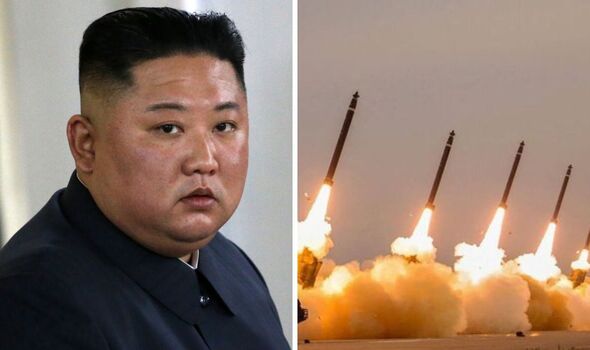North Korea spent a staggering £40 million in its latest missile launch, while people struggle to buy food on wages of 79 pence a month.
The money could have bought more than 80,000 tonnes of rice to help feed its people and alleviate the country’s food shortages which last year resulted in people dying from famine.
North Korea fired a barrage of around 10 missiles from an area close to the capital Pyongyang on Thursday, according to South Korea’s military.
The rockets are believed to have been short-range ballistic missiles which flew around 350 kilometres (217 miles) before landing in waters off the North’s eastern coast. It drew strong condemnation from Japan’s Prime Minister Fumio Kishida, who said the tests were a clear breach of UN Security Council resolutions.
Bruce Bennett, a senior defence analyst at the RAND Corporation, has estimated that it costs North Korea between $3 million US dollars for a short-range missile test to $10 million for a long-range missile.
He told Vox America: “That’s what it’s costing North Korea when [its labor costs] are very cheap. These are very rough estimates, and they are nothing like what it would cost the United States to do missile tests.”
An average wage of a North Korean worker is thought to be between one and three US dollars a month, according to the website timecamp.com
If the average price of a missile test in North Korea is US$ 5 million (£4m), then the total cost of these latest tests works out to be around $50 million (£40m).
In February, the price for a ton of rice in the UK was on average £494, according to data provided by the website indexmundi.com
This means that North Korea’s leader Kim Jong un could have purchased 80,971 tonnes of rice to help feed his starving people, instead of blasting off rockets into the sea.
North Korea has never been able to produce enough food for its 26 million people and has suffered frequent famines.
During an economic crisis that gripped the country between 1994 and 1998, between 240,000 and 3,500,000 North Koreans are believed to have died from starvation and hunger-related illnesses.
Last year the country was once again plunged into a food crisis, which again resulted in more famine related deaths.
One woman living in the capital Pyongyang told the BBC she knew a family of three who had starved to death at home.
“We knocked on their door to give them water, but nobody answered,” she said. When the authorities went inside, they found them dead, she added.
